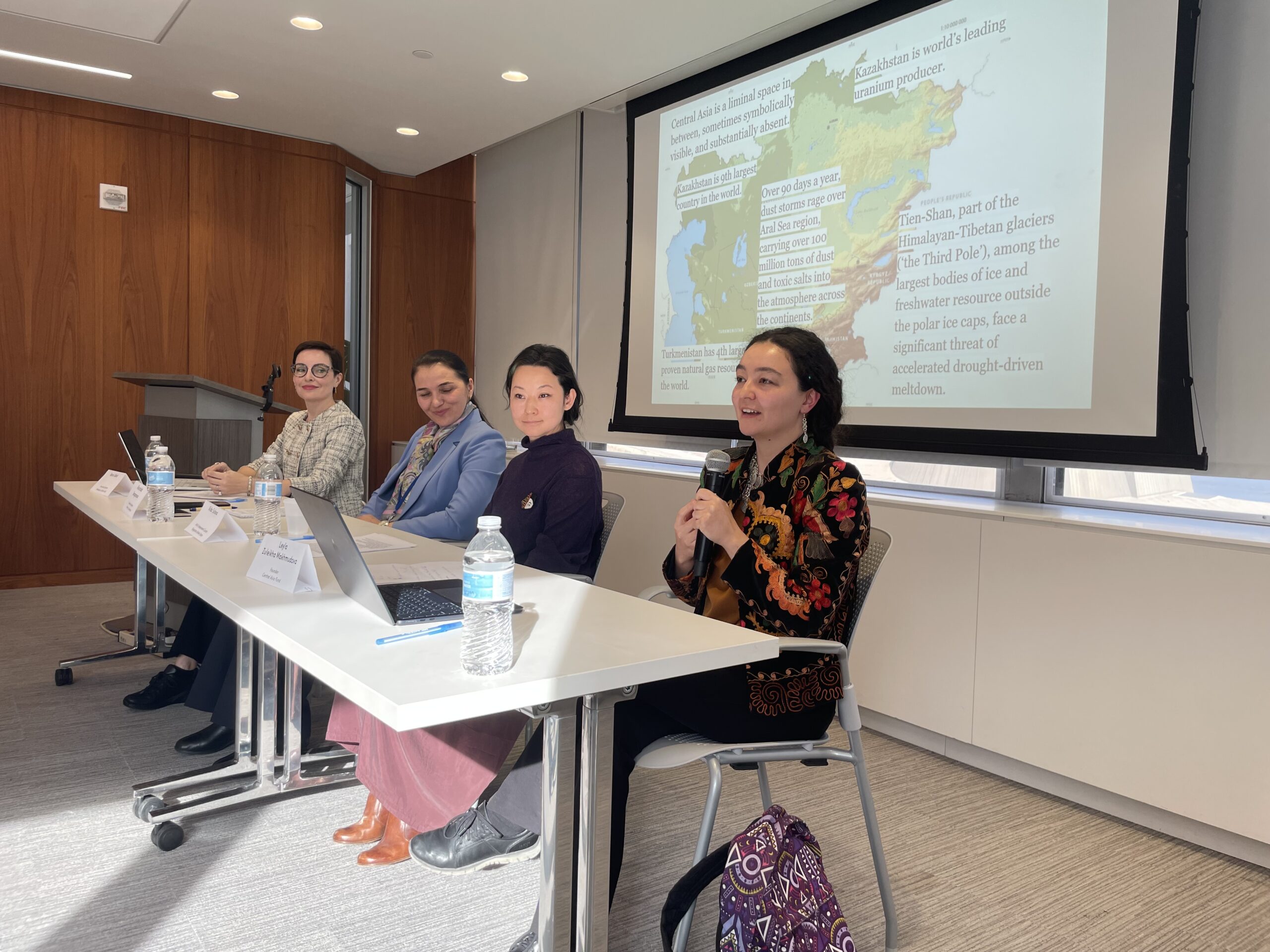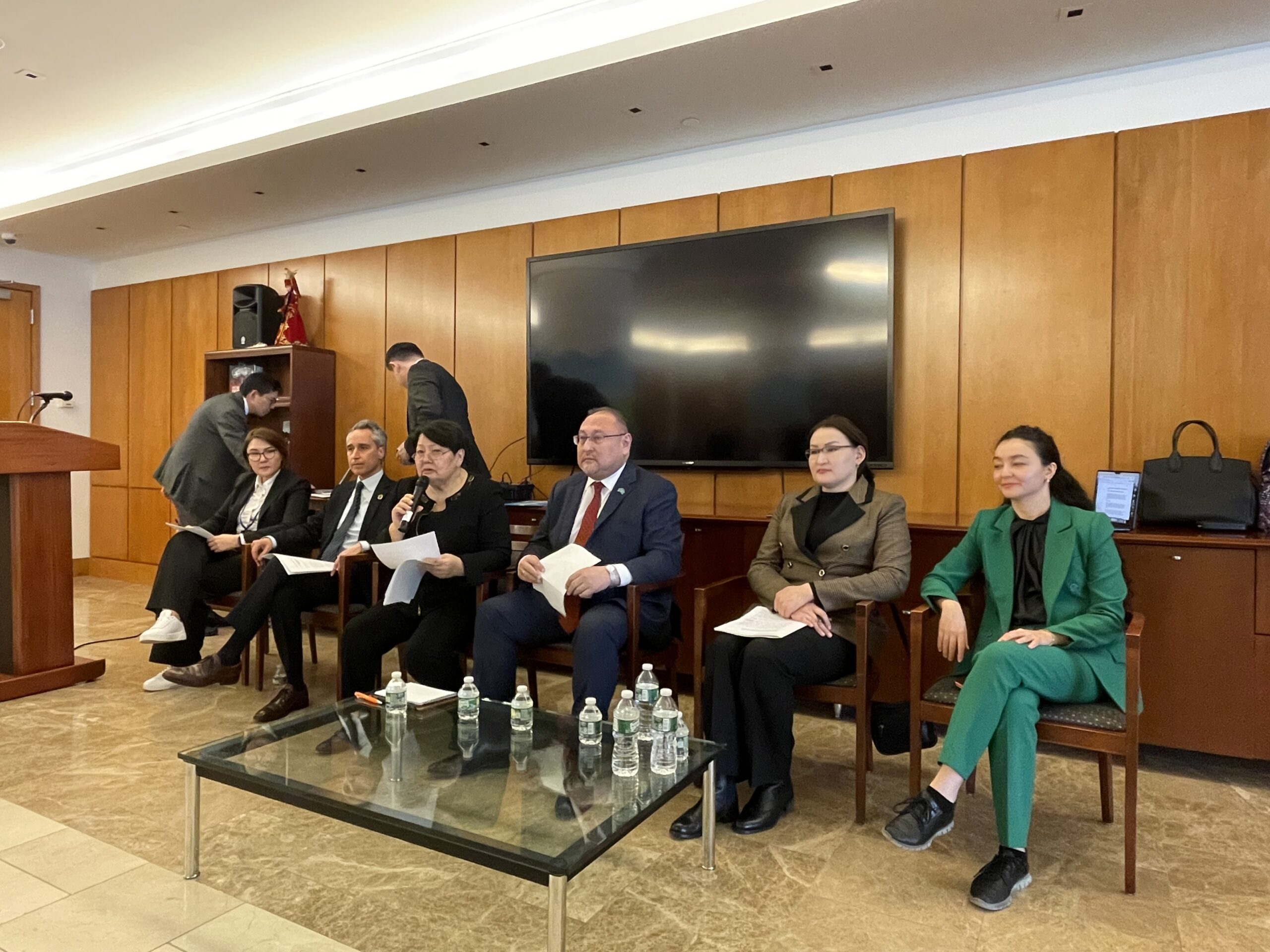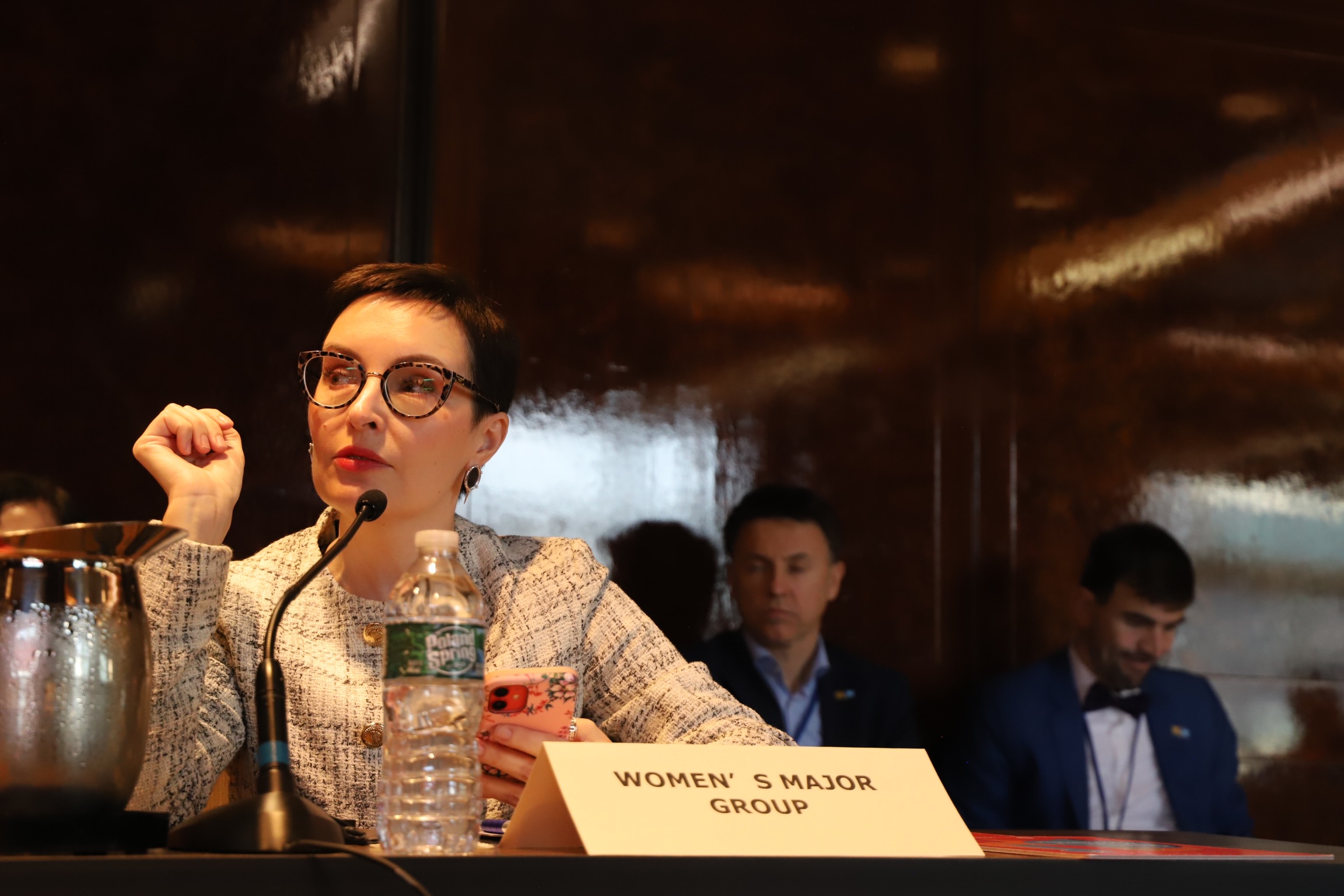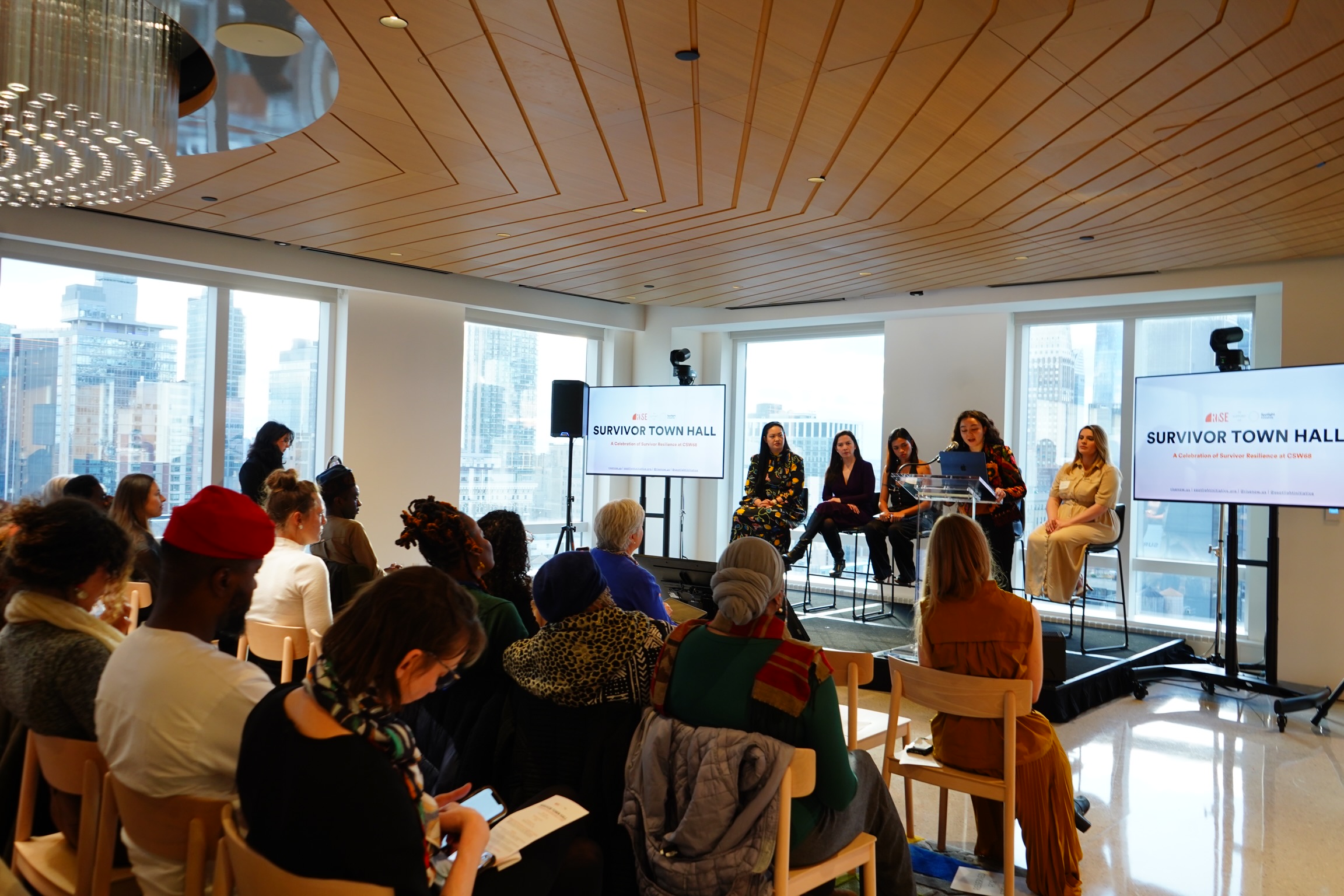ASTANA – In an effort to shed light on Central Asian women-led initiatives and to promote them on a global scale, the FemAgora public foundation marked its first participation in the 68th session of the Commission on the Status of Women (CSW68) in New York this March. In an interview with The Astana Times, founding members of the regional organization spoke about long-awaited achievements, challenges, and the work ahead.

Xeniya Udod, Khurshida Ibragimova, Aida Sulova, Leyla Zuleikha Makhmudova at the parallel event. Photo credit: Akmyrat Tuyliyev.
“Since its onset and up until today, FemAgora’s mission is to strengthen, amplify and celebrate feminist, women-led, gender-aware and sensitive work, cross-sectoral expertise, and collective leadership of grassroots practitioners like ourselves,” said FemAgora Founding Strategic Director Leyla Zuleikha Makhmudova.
FemAgora strives to deepen solidarities among Central Asian communities and beyond, according to its founder.
Women’s voice from Central Asia on a global arena
This year, FemAgora reached new heights. Two team members, Makhmudova and Xenia Udod, the executive director of the foundation, took part in the annual CSW. It was the first time for the organization to participate in the United Nations largest annual gathering on gender equality and women’s empowerment.

The CSW68 parallel event organized by the Kazakh government. Zhuldyzay Iskakova, Ziad Sheikh, Madina Dzharbussynova, Akan Rakhmetullin, Nazgul Sagindykova, Leyla Zuleikha Makhmudova. Photo credit: FemAgora.
The program was dedicated to accelerating the achievement of gender equality and women empowerment by addressing poverty, strengthening institutions and financing with a gender perspective.
According to FemAgora Digital Operations Director Daria Kasmamytova, the topic aligns with the goal of the organization to “strengthen women-led ecosystems through public engagement and resource-sharing arrangements, as well as to build solidarity among the communities.”
“We are committed to advocating for long-term and unrestrictive funding to the under-resourced civil society of Central Asia. This is the reason why we collectively made continuous efforts to get to the CSW68,” she said.
“FemAgora has been strategizing and planning participation to represent our Central Asian women-led grassroots initiatives, demonstrate local expertise and knowledge, build connections, and become more visible,” added Kasmamytova.
The parallel event held by the foundation allowed its members to introduce the history of FemAgora.
“We are deeply thankful to Khurshida Ibragimova, a prominent gender expert, the founder of Mehrjon [the center for social support and adaptation of women and children in the Uzbek city of Fergana], for joining us as our co-presenter, and to Aida Sulova, the U.S.-based multidisciplinary artist and an independent curator from the Kyrgyz Republic, for her skilful moderation of our discussion,” said Makhmudova.
When discussing the course of events, she recalled a fellow grassroots feminist from Africa who discovered Central Asia as a region by joining FemAgora’s parallel discussion.
“She said she had never heard anything about Central Asia, but joined our event out of curiosity, solidarity, and willingness to build connections across distances and differences we had,” said Makhmudova.
FemAgora’s participation in side events
As part of the CSW68, Makhmudova made a speech at the event hosted by the Permanent Mission of Kazakhstan to the UN in New York with participation of representatives from Kazakhstan’s National Commission for Women’s Affairs, Family and Demographic Policy, and the UN Women.

Udod represented FemAgora at the Women’s Major Group international network of 1,000 civil society organizations (CSOs) on the CSW68 Local and Regional Governments Day. Photo credit: United Cities and Local Governments (UCLG).
Speakers elaborated on the importance of strengthening and expanding social protection systems to ensure inclusiveness and gender sensitivity.
“We elaborated an engagement strategy to make our participation as effective and meaningful as possible. Apart from days full of networking and experience sharing, we participated as speakers in several events organized by our partners, as well as held our own parallel event,” said Udod.
Speaking about FemAgora’s research of Central Asian crisis centers’ experiences during the pandemic, Udod noted Makhmudova’s efforts aimed at “recognizing crisis centers and grassroots non-governmental organizations (NGOs) as equal parts of the social protection architecture and ensuring their access to mobility and work during states of emergency.”
These aspects were raised by Makhmudova during the side event. “In her intervention, Leyla focused on the indispensable role that civil society organizations (CSOs), particularly crisis centers, have been playing during recent global and regional distress,” said Udod.
In FemAgora’s perspective, crisis centers should be provided with sustained, institutional financial support regarded not as a charity, but an investment in the safety and well-being of civil society.
Back to the origins of creation
Back in 2018, Makhmudova came up with an idea of creating a Central Asian feminist festival as an annual cultural event. Together with 15 leaders of local communities in Almaty, public activists held thematic festivals showcasing women representation in art, media, health, science, cinema, economics, and politics.

Makhmudova speaking in the Survivor Town Hall. The CSW68 Celebration of Survivor Resilience organized by Rise and Spotlight Initiative. Photo credit: RISE.
By the end of 2019, given the opportunities provided by the festival for a raft of gender-sensitive initiatives, Makhmudova registered FemAgora as a public foundation in Kazakhstan to ensure the project’s further development.
“In 2020, my friend and colleague Selbi Jumayeva joined me as FemAgora’s co-founder, and in 2021, we formed our first regional collective of grassroots artists, practitioners, and researchers from all five Central Asian states,” she said.
Today, FemAgora represents a team of six leading experts and a vivid community of more than 300 Central Asian contributors.
“FemAgora has been working towards achieving Sustainable Development Goals (SDGs) and promoting the UN Security Council Resolution 1325 by participating in work of global platforms, such as Generation Equality Forum (GEF), Spotlight Initiative Regional Programme for Central Asia and Afghanistan, Beijing+25, Beijing+30, and CSW among others,” she noted.
FemAgora’s fifth anniversary
This year marks FemAgora’s fifth anniversary. As noted by Udod, foundation members will document experiences and best practices, while working on the ongoing projects.
“Of course, we’re going to continue developing our constructive interaction with global platforms, including CSW. We’re already planning events for CSW69 next year with an ambitious vision of holding a regional parallel event in cooperation with other women-led and feminist groups from Central Asia,” she said.
In 2025, CSW69 will be dedicated to the 30th anniversary of the Beijing Declaration and Platform of Action. The landmark document is a visionary agenda for advancing women’s rights and gender equality worldwide.
“Our goal is to ensure the engagement of women and CSOs from Central Asia in reviewing the progress made by our region in implementing the Beijing Declaration and Platform for Action,” said Udod.
Apart from that, FemAgora was elected as a member of the Beijing+30 Civil Society Steering Committee organized by the region’s women-led and feminist groups and the UN Women Regional Office for Europe and Central Asia.
For FemAgora, the jubilee year will be yet another occasion to “celebrate reciprocity and interconnectedness with one another.”

